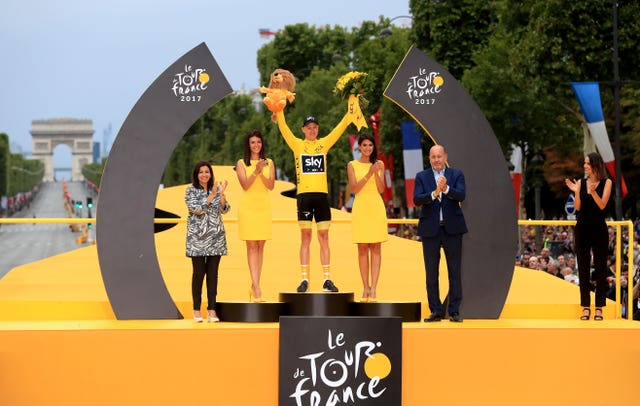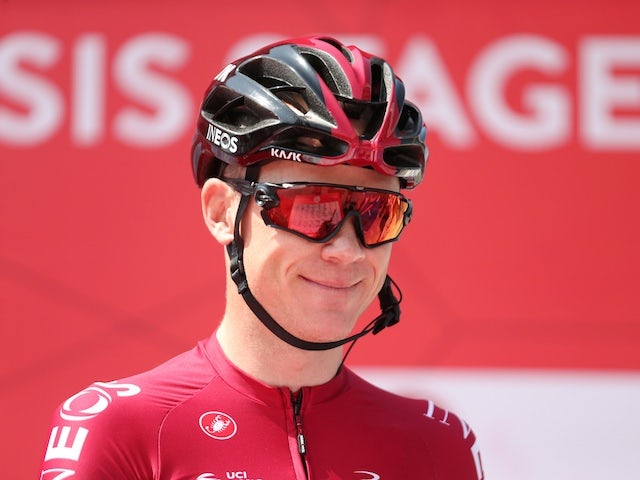Chris Froome has admitted to making mistakes during his rehabilitation last year as he chased a quick return to the Tour de France.
The four-time Tour winner, who turned 36 last week, once again has his sights on a return to the race this summer, now armed with a better understanding of his body nearly two years after the horror training crash which threatened to end his career.
Such was Froome's determination to race the Tour last year – a target he ultimately missed in his final season with the Ineos Grenadiers – he bypassed key elements of the process and paid a price later.
"In hindsight it would have been much better to really take time out and focus on the rehab side of things, rather than chase things on the bike," Froome told the PA news agency.
"Getting to the end of last season, seeing the weaknesses I still had, it was clear the focus for the winter and the first part of this season needed to be trying to address those imbalances rather than chasing bike form.
"Having that goal of being ready for the Tour meant I wasn't doing my rehab properly. I was trying to get as fit as possible for July where I should have been engaged in the muscle imbalances."
Froome was speaking from a training camp in Tenerife where he hoped the long journey back to fitness was nearing completion.
Froome has leaned heavily on Israel Start-Up Nation's partnership with tech firm Hammerhead, who have delivered software and hardware updates to their cycling computer tailored to his recovery process.

Such has been the importance of the relationship that Froome has now become a significant investor in the US-based company, joining their advisory board to help develop products.
At the start of this year, Froome revealed isokinetic testing found a 20 per cent strength deficit in his right quad versus his left. His Hammerhead computer offers him live on-bike data comparing right leg against left as he trains to address the imbalance.
"I can actually have intervals where I'll shift the focus on to the right side and do efforts with 70 per cent of the effort done just by the injured leg, to fast track that leg into working the way it should do again," he said.
"The hamstrings need the most work. They're probably in the 15-20 per cent range of deficit, the quads are about 10 per cent, and the hip rotators are within five per cent, so I consider the rehab finished there."
Patience has been the most difficult part of this process for Froome, who knows that chasing what would be a record-equalling fifth Tour crown only gets more difficult over time.
"I'm still the same person, my expectations haven't changed," he said. "I still want to be there fighting it out with the best in the world but all the will in the world wouldn't get me there if the physical process of rehab isn't 100 per cent complete."
Results on the road have only highlighted the uphill battle Froome has fought. He was 96th overall at the Tour de Romandie, 93rd in the Tour of the Alps, and 81st in the Volta a Catalunya, struggling to keep up on the climbs where he once thrived.
"In every race these days, the level is so high," he said. "If you go to a race to try to use it as training you're going to get spat out of the back straightaway.
"For me, having spent so much time focusing on rehab work, naturally I'm going to be behind in the race.
"Now the focus is shifting more to being race ready, getting the weight down to race weight."
As he focused on rehab, Froome insisted he had not followed the medical tribunal of Richard Freeman, which determined the former British Cycling and Team Sky doctor had ordered testosterone "knowing or believing" it was to dope a rider.
Freeman, who now faces charges from UK Anti-Doping, has launched an appeal.
"Certainly if that's the case, it's very worrying," Froome said of the verdict. "But to be honest it seemed to take so many different directions from the headlines I saw, I sort of gave up following it. I didn't know what to believe."
Froome's next target is the Criterium du Dauphine, the traditional Tour warm-up which starts on May 30. As the opening stage of the Tour looms on June 26, Froome is keeping his goals realistic.
"I'd certainly like to get a lot further into the climbs, that already would be a huge win for me, to see a progression," he said. "But if I'm going there to help (team-mate) Michael Woods, I'm not going to be thinking about my own GC position.
"I'll set myself goals within the race that align with the team goal, but certainly if I can see progression in the numbers, that would be a win.
"I'll just take it one phase at a time, one race at a time, see how the Dauphine goes and then I can set realistic expectations for the Tour."








